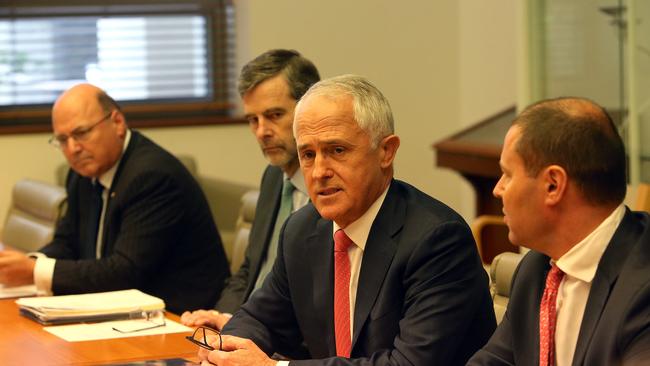Gas industry hits back at Canberra’s plan to restrict gas exports
The gas industry has pushed back against the PM’s plan to curb some LNG exports if there is a domestic gas shortage.

The gas industry has hit back at Malcolm Turnbull’s plan to curb Queensland LNG exports if there is a domestic gas shortage, saying it is “alarming”, unlikely to ease price or supply and could actually make the problem worse, as Santos shares were hit hard on uncertainty over how the plan would work.
The biggest Queensland gas exporter, the Australia Pacific LNG project, run by Origin Energy and ConocoPhillips, has criticised the extra regulation, saying it is not likely to have an impact on price or supply.
Industry group the Australian Petroleum Production and Exploration Association says the move was “almost unprecedented” and risked worsening the situation.
APLNG chief Warwick King said the nation’s energy market challenges could only be resolved by engaging with all of the sector, not just Queensland LNG exporters
“APLNG does not support additional regulation such as export permits, as these sorts of interventions will not increase supply or decrease price in the near or long term,” Mr King said.
“COAG’s vision for establishing a liquid wholesale gas market that provides market signals for investment and supply can provide the platform for affordable sufficient gas supply to Australia’s east coast.
APPEA chief Malcolm Roberts said the announcements were short-term measures that “risk exacerbating tight market conditions unless accompanied by genuine reforms.”
“Restricting exports is almost unprecedented for Australia,” said APPEA Chief Executive Malcolm Roberts.
“At a time when we need billions in new investment to create more gas supply, any intervention that creates sovereign risk is alarming.”
He said the only way to ensure long-term energy security was to remove restrictions on exploration and production.
Santos shares have been hit hard on uncertainty over how Malcolm Turnbull’s plans to curb LNG exports if there is a domestic gas shortage would work, whilehas criticised the extra regulation as not likely to have an impact on price or supply.
Analysts said it was unclear how the measures would be put in place and questioned whether they would actually lower domestic prices.
The $US18.5 billion Santos-led Gladstone LNG plant is the only one of three LNG export projects at Gladstone whose model is to source gas from the domestic market (59 per cent of it in the past quarter) rather than supply all exports from its own gas.
As a result, GLNG will bear the brunt of the new Australian Domestic Gas Security Mechanism if it is ever implemented.
“Santos will seek clarification of how the new policy will work in practice in order to understand from Government the terms on which it is proposing to introduce this mechanism and how proposals that have been put to Government to address the domestic market situation are being considered,” Santos said.
“Santos will work collaboratively with Government and its joint venture partners to ensure an outcome in the best interests of its shareholders.”
At 2.30pm (AEST), Santos (STO) shares were down 20 cents, or 5.5 per cent, at $3.44. Origin Energy (ORG), which runs the Australia Pacific LNG plant at Gladstone with ConocoPhillips (and which is a net contributor to the domestic market) were down 4.5 per cent at $7.19.
Credit Suisse analyst Mark Samter said the move was a “momentous decision” but that it was unclear what the impact would be.
“While we believe action was firmly needed to fix the market, there is far more information needed on this all to form a firmer view,” he said.
“The natural reaction may be for the market to punish Santos, at face value, though, if all GLNG has to do is sell at export netback, then they are free cashflow ambivalent.”
JPMorgan analyst Mark Busuttil said the impact for Santos and GLNG were likely to be on its reputation as a supplier, rather than financial.
“Key questions remain what the definition of “shortfall” is and how frequently these export limitations could be imposed, and whether more drastic actions could be taken by policymakers given, that the measures only address short-term supply security and may not lower domestic gas prices over the long term,” Mr Busuttil said.
“Furthermore, the actions by the Government could actually stymie further investment in much needed upstream development.”




To join the conversation, please log in. Don't have an account? Register
Join the conversation, you are commenting as Logout